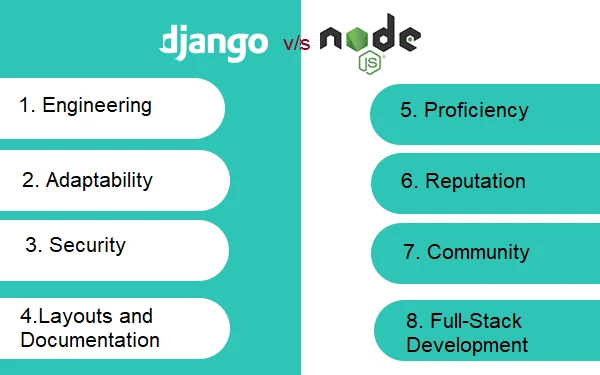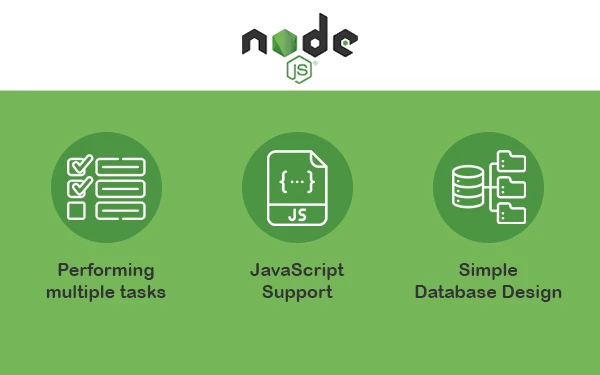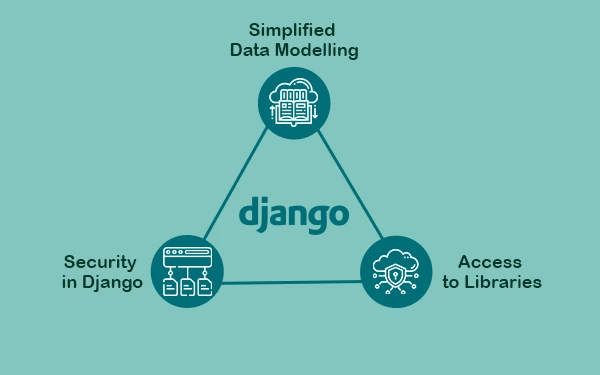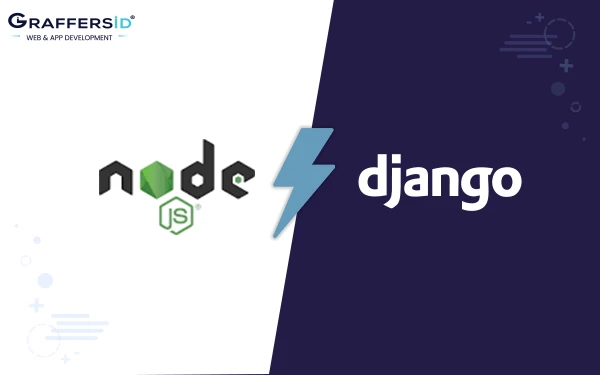In this blog, we will have a detailed comparison between two dynamic technologies Django vs NodeJS used for building versatile websites, Web, and mobile apps with an interactive user interface.
In a website and web app, it is crucial to have an interactive UI ( User Interface ) to attract and engage more and more users.
Node JS and Django, both the programming languages are reasonably profoundly compelling innovations for building adaptable web and mobile applications with a brilliant UI.
Each is available to all and comes without going through a dime with a non-permit required. They are used in many immense activities and have a huge web community.
What is Django?

Django was created by Django programming; it was supported in 2005 and planned by Adrian Holovaty and Simon Willison. The fundamental highlight of Django is that the High-level mostly Python internet system as this structure offers the foremost ideal approach to arranging the application.
When you hire dedicated Django developers, make sure that as an engineer observes the principles or approach to carry out the undertaking in Django, there is nearly less opportunity contrasted with the low-level structure; however, the application made will be perfect and clean.
Django fundamentally follows the plan design named Model Template View plan design.
It is likewise like the MVC system aside from the format thing. Like MVC, MTV has likewise the information access layer in the Model. Basically, this model handles the way toward connecting and relating of the information, further approving the information.
The layout layer is alluded to as a show layer that handles what has to be compelled to be shown on the website page or application. The read is the business layer because it gets to the model’s foursquare and shows an acceptable layout. The view works like a scaffold between the Model and the format.
What is Node JS?

Node JS is predicated on JavaScript and utilized on the customer side of web applications. On the other hand, Django works with Python capacities inside a structure of the cutoff time to help web engineers develop applications progressively and extra quickly.
Node JS was planned by Ryan Dahl and created by Joyent. It was 1st delivered within the year 2009. It was written in C, C++, and JavaScript. All in all, Node JS is a JavaScript stage that has capacities like a web worker that permits designers to compose total and exceptionally adaptable web applications utilizing JavaScript.
Nodejs supports the Google V8 JavaScript motor. There area unit an oversized range of open-source libraries to assist Nodejs.
It has a ton of highlights like an Event-driven model, simultaneousness, straightforward and lightweight, and non-hindering info yield. Node JS brings forth one and only one working framework string on the worker machine in the occasion-driven model, and it keeps a little pile demand.
When you Hire NodeJS Developers, It allows them to create Intuitive and Interactive software.
This occasion is alluded to as an association being set up, an exchange being prepared, getting information from the association, and an association conclusion. They get back to work related to these occasions so that work is terminated as any occasion gets finished.
Now, a question might be arising in the mind of many of our readers that
Is Django better than NodeJS in 2024?
Node JS is prevalent in building robust, adaptable applications and capacities to deal with a great many requests, while Django, as well, is incredible at dealing with a huge number of requests and high-traffic applications. The two stages are reasonable for building adaptable applications.
Nodejs is not as secure as Django and requires manual activities in the framework to oversee security blemishes. It offers better execution, as there is an inherent house layout framework working with the execution of a necessary assignment quickly. It is open-source Python-based.
This system is restricted. Django is very complex. In terms of complexity, Node JS is less convoluted than Django, there are a few highlights that you need to consider while picking between the two structures, and this blog on ‘Django versus Node JS.
The difference between Django and Node JS has shed light on some of them. In this way, on the off chance that you are proficient in JavaScript or have sufficient opportunity to learn and execute it, Node JS is the best approach.
In any case, on the off chance that you have cut-off times to meet, have experience with Python, and are worried about understanding the highlights, you should select Django to make your application.
Want to know Golang vs NodeJS: Which is better?
Should You use NodeJS or Django?
Node JS depends on JavaScript and is utilized on the customer side of web applications. Then again, Django works with Python applications inside a structure of the deadline time to help web designers fabricate applications continuously and even more rapidly.
Node JS is prevalent in building powerful, adaptable applications and capacities to deal with a huge number of requests, while Django, as well, is superb at dealing with many requests and high-traffic applications. The two stages are appropriate for building adaptable applications.
When to use Django vs NodeJS?
Node JS
- Node JS has better utilization inclusion in more site classes. Counting Computers Electronics and Technology, Law and Government, Arts and Entertainment, Lifestyle, and many different types.
- It is anything but a breakthrough in JavaScript advancement, giving new freedoms to JS subject matter experts. This moderately direct programming language is normally found in a customer-side program. Node.js can be utilized for the backend also, which means the whole application can be made with JavaScript. The information and abilities expected of full-stack developers have advanced, and hopefully, developers can start dispatching their applications a lot quicker, without learning extra complex innovations.
- Node.js can be effectively dominated on the off chance that you have fundamental information on JavaScript.
- An enormous assortment of free libraries and augmentations make Node.js profoundly adaptable. You can modify the advancement climate depending on your inclinations and task targets.
- An event-driven model sets up associations between occasions in a program and on the worker side, and banners the fulfillment of various cycles. Parts of HTML code in a program can fill in as subjects, while any JS capacities can function as eyewitnesses.
- Node.js is lightweight and simple to dispatch.
- It gives progress versatility and simultaneousness.
- Web workers consequently get and react to ask for. No information or yield is required.
Django
- Django is driving in Science and Education and Heavy Industry and Engineering.
- It is anything but a Python-based structure, planned chiefly to guarantee rapid website development.
- It centers on undeniable level cycles and modified works of low-level ones.
- Django can be effortlessly scholarly in the event that you have fundamental information on Python.
- Web designers need to follow exacting standards and formalized situations for project execution. While this to some degree limits inventiveness, it guarantees exact code, direct application engineering, and fewer blunders and bugs on the yield.
- Model Template View is utilized as a plan design. It is like the Model View Controller model, except for the format segment. The model gives admittance to information, to concentrate and change it. The layout shows how information is shown to clients. The view is a connection between the Model and the Template that tracks different occasions and shows changes that should be acquainted with the Model.
- Each Django undertaking can have a solitary or various inside applications.
Django vs NodeJS: Key differences

1. Engineering
Django is a system and Node JS is a runtime environment.
Django predominantly follows the plan design called Model Template View. The model handles the way toward communicating, relate, or approving the information.
Node JS, then again, has a ton of highlights like an occasion-driven model, simultaneousness, and non-impeding information yield. In the occasion-driven model, Nodejs generates just one working framework string on the worker machine, and it is anything but a little stack demand.
2. Adaptability
Django is a system. It powers clients to utilize a specific construction that relates to the MTV design. A client would have to change the construction significantly more to play out a similar assignment in Django as in NodeJS.
Nodejs, then again, gives significantly more space for adaptability. The capacity to make various types of applications is much more extensive since the client can fabricate anything they desire without any preparation, and without experiencing opposition from the program.
Django with its restricted advancement highlights makes it hard for the engineers to carry out their standards, in this manner, it is less adaptable when contrasted with Node.js.
Node.js is exceptionally fit for offering various functionalities, devices, and highlights to its designers as it is associated with a huge JavaScript library.
3. Security
Django is significantly safer than Node JS. It has built-in help to forestall security imperfections, for example, cross-site prearranging.
JavaScript has all the security for an appropriate form, yet you need to physically change the anticipation highlights to carry out them.
4. Layouts and Documentation
Django utilizes an in-house layout framework. These aides execute the necessary undertaking rapidly without spending an excessive amount of time choosing the strategy. It additionally has broad documentation.
Nodejs, then again, permits designers to have much more opportunity to pick their particular manner to execute the usefulness. Notwithstanding, this likewise implies that a client will invest much more energy in sorting out an approach to play out the necessary undertaking.
5. Proficiency
Django is quite possibly the most perceptive structure to pick by engineers for building web applications. It is exceptionally proficient while requiring less of an ideal opportunity to execute because of underlying layouts.
Furthermore, Django is somewhat quick when contrasted with Node.js. Since the climate requires working time when executing an issue, it is less effective when contrasted with Django. Node.js is not difficult to adapt to, however less practical to understand.
6. Reputation
Django is an exceptionally presumed system for building web applications when contrasted with NodeJS.
NodeJS is gradually acquiring prominence in the local area and is required to flourish in the coming very long time for building versatile web applications.
7. Community
Django is an open-source system however, the viable local area behind the structure is somewhat small.
Then again, the local area behind Node.js is effectively expanding and includes experienced developers. They further assist the clients with a wide range of issues identified with the updates, and that is only the tip of the iceberg.
8. Full-Stack Development
Django is not fit for offering full-stack advancement freedoms to designers across the world.
Then again, the developers can utilize Node.js to construct the front end just as the back end thus it is accessible for full-stack improvement.
Benefits of Node JS

1. Performing multiple tasks in Node JS
Various concurrent activities can be taken care of by JavaScript as it dominates with ongoing frameworks. NodeJS is an occasion-driven system in which solicitations are put on an occasion circle, prepared, and designated likewise.
By this, the applications and administrations can deal with various demands all at once which is an extraordinary benefit for circulated application frameworks.
2. JavaScript Support
When you hire developers for your startup, they can compose both front-end and back-end application code in JavaScript. This aids them in making reusable code and modules that they can recover with no issue.
3. Simple Database Design
Software engineers do not need to announce a severe plan while creating data sets with the goal. They can more effectively convert all the information base passages into objects of JavaScript to work on information access.
Limitations of Node JS
- Data Processing Limits
- Call-back Overloads in Node.js
Benefits of Django

1. Simplified Data Modelling
Django chips away at the Model Template View Framework which changes over information into a particular model and causes it to affirm application rationale.
Finally, it sends that specific model to the layouts, which helps in organizing the information. Django is advancing with an implicit tempting language framework that creates HTML, isolates rationale from sees, empowers code reuse, and channels content before it arrives at the program.
2. Security in Django
The engineers in Django can likewise get to a scope of safety highlights. For instance, there are instruments in the structure to embed secret, client-explicit tokens into post demands that assist in guarding against cross-site pre-arranging and demand fraud. The structure likewise gives different highlights that watch explicitly against SQL infusion assaults.
3. Access to Libraries
This Python-based structure admits designers of different quantities of set-up Python libraries. A structured library is likewise given by the system that renders HTML design in an improved way.
Consequently, you get more front-end configuration control as designers can guarantee the connection between explicit matches with an application to coordinate with the visual application.
Limitations of Django
- Catching Risks in Django
- Multiple Request Handling
Which framework is better for developing RESTful APIs?
Pros of Node.js for RESTful API Development:
- Speed: Node.js is known for its fast execution, thanks to its asynchronous, non-blocking I/O model. This makes it highly efficient for handling multiple requests simultaneously.
- Single Language: With JavaScript being the primary language for both server and client-side development, Node.js allows for seamless collaboration between front-end and back-end developers, fostering a unified development environment.
- Extensive Ecosystem: Node.js has a vast collection of libraries and modules available through npm (Node Package Manager), enabling developers to easily integrate third-party tools and packages into their projects.
Cons of Node.js:
- Callback Hell: The asynchronous nature of Node.js can lead to “callback hell” if not handled properly, making the code complex and challenging to maintain.
- Less Opinionated Structure: While flexibility is an advantage, it can also be a drawback as Node.js is less opinionated about project structure, leading to variations in coding practices among developers.
Pros of Django for RESTful API Development:
- High-level Abstractions: Django provides high-level abstractions, such as Object-Relational Mapping (ORM) and built-in admin interface, reducing the need for boilerplate code and speeding up development.
- Built-in Authentication and Authorization: Django comes with robust authentication and authorization systems, streamlining the process of securing your API endpoints.
- Django REST Framework (DRF): An extension for building APIs, DRF simplifies API development with features like serialization, viewsets, and authentication classes, making Django a powerful choice for RESTful APIs.
Cons of Django:
- Learning Curve: The comprehensive nature of Django might pose a steep learning curve for beginners, especially those new to Python.
- Flexibility vs. Opinions: While Django provides a well-defined structure, it may be perceived as restrictive by developers who prefer more flexibility in choosing libraries and tools.
If speed, scalability, and a vibrant ecosystem are crucial, Node.js may be the way to go. On the other hand, if you value a well-structured, opinionated framework with built-in features, Django could be the perfect fit. Remember, both frameworks have proven track records and thriving communities, so you can’t go wrong with either choice. The key is to align the strengths of the framework with the specific needs of your project for a successful API development journey.
What are the advantages of using Django over NodeJS in 2024?
As we step into 2024, it’s worth revisiting the age-old debate to discern which framework holds the upper hand. While Node.js has undoubtedly made significant strides, Django continues to reign supreme in several key aspects. Let’s delve into the advantages of Django over Node.js in the current year.
Rapid Development:
Django, known for its “batteries-included” philosophy, offers a plethora of built-in features and functionalities out of the box. With Django’s robust ORM (Object-Relational Mapping) system, authentication mechanisms, and admin interface, developers can kickstart projects swiftly without reinventing the wheel. This streamlined development process translates to faster time-to-market, making Django an ideal choice for agile development teams.
Scalability and Performance:
While Node.js excels in handling I/O-bound tasks thanks to its event-driven, non-blocking architecture, Django shines in scenarios requiring heavy computation and processing. Django’s synchronous nature, coupled with its efficient handling of database queries and caching mechanisms, makes it exceptionally well-suited for building scalable, high-performance applications. Furthermore, Django’s mature ecosystem offers a myriad of optimization tools and techniques to fine-tune application performance, ensuring smooth scalability as user demand grows.
Security:
In today’s cybersecurity landscape, robust security measures are non-negotiable. Django, with its built-in security features and emphasis on best practices, provides a solid foundation for developing secure web applications. Django’s integrated user authentication, CSRF (Cross-Site Request Forgery) protection, and secure session management mitigate common vulnerabilities, shielding applications from threats such as SQL injection and XSS (Cross-Site Scripting) attacks. Moreover, Django’s active community and prompt security updates ensure that developers stay ahead of emerging threats, bolstering the framework’s reputation as a secure choice for web development.
Community and Ecosystem:
While Node.js boasts a vast and vibrant ecosystem fueled by its npm (Node Package Manager) repository, Django’s community is equally thriving and supportive. Django’s extensive documentation, comprehensive tutorials, and vibrant online forums provide developers with a wealth of resources and expertise to draw upon. Additionally, Django’s ecosystem offers a rich selection of reusable apps and libraries, enabling developers to accelerate development and leverage battle-tested solutions for common tasks. The collaborative nature of the Django community fosters knowledge sharing and innovation, empowering developers to build robust, maintainable applications with confidence.
Maintainability and Code Organization:
Django’s opinionated design and adherence to the MVC (Model-View-Controller) architectural pattern promote clean, organized codebases that are easy to maintain and scale. With Django’s intuitive project structure and separation of concerns, developers can compartmentalize functionality into reusable components, enhancing code readability and facilitating collaborative development. Django’s emphasis on convention over configuration reduces cognitive overhead, allowing developers to focus on solving business problems rather than grappling with configuration nuances. As a result, Django projects tend to exhibit greater consistency and maintainability over time, minimizing technical debt and facilitating long-term scalability.
While Node.js remains a formidable contender in the realm of web development, Django continues to assert its dominance in 2024 with its unmatched blend of rapid development, scalability, security, community support, and maintainability. Whether you’re embarking on a new project or seeking to enhance an existing application, Django stands as a steadfast choice, empowering developers to craft robust, secure, and maintainable web solutions with confidence. As the digital landscape evolves, Django remains a steadfast beacon, guiding developers toward success in the ever-changing world of web development.
Which framework is more suitable for building web applications quickly?
Consider the specific requirements of your project. If real-time features and high concurrency are critical, Node.js might be the preferred choice. For projects with a strong emphasis on data modeling and content management, Django’s robust features may be more suitable. Also, Assess the expertise of your development team. If your team is well-versed in JavaScript, Node.js could provide a more seamless development experience. Conversely, if your team has a strong Python background, Django might be a more natural fit.
In addition, Node.js, with its non-blocking architecture, excels in handling a large number of concurrent connections. Django, on the other hand, offers a structured and scalable approach, particularly beneficial for complex applications.
Which framework is more suitable for large-scale applications?
Both Node.js and Django are popular frameworks used for developing web applications, but they have different characteristics and are suited for different use cases. Here’s a comparison to help you decide which framework is more suitable for large-scale applications:
-
Node.js:
- Scalability: Node.js is known for its ability to handle large-scale applications with high concurrency. It uses an event-driven, non-blocking I/O model, making it well-suited for applications that require real-time interactions and high throughput.
- Performance: Node.js leverages JavaScript’s V8 engine to execute code, providing excellent performance. It’s particularly efficient for handling I/O-bound operations.
- Flexibility: Node.js is highly flexible and can be used to build various types of applications, including real-time chat applications, streaming services, and microservices architectures.
- JavaScript Ecosystem: Node.js has a vast ecosystem of libraries and modules available through npm (Node Package Manager), which helps accelerate development and provides access to a wide range of functionality.
-
Django:
- Rapid Development: Django is a high-level Python web framework that emphasizes the principle of “don’t repeat yourself” (DRY) and encourages rapid development. It provides a lot of built-in functionality and follows a batteries-included approach.
- Convention over Configuration: Django follows a “batteries-included” philosophy, providing a set of predefined conventions and structures that help developers quickly build applications. This can be beneficial for large-scale projects with a defined structure and established patterns.
- ORM and Admin Interface: Django’s built-in Object-Relational Mapping (ORM) allows developers to interact with databases using Python instead of writing raw SQL queries. Additionally, Django’s admin interface provides automatic scaffolding for administrative tasks, making it easier to manage content.
- Python Ecosystem: Django benefits from the extensive Python ecosystem, with a wide range of libraries and modules available for different use cases.
Django vs NodeJS: Which has better performance?
When comparing the performance of Django and Node.js, several factors come into play:
- Speed: Node.js, with its non-blocking I/O model, excels in handling concurrent connections and performing I/O-intensive tasks efficiently. This makes it highly suitable for applications requiring real-time data updates or heavy asynchronous operations. Django, on the other hand, offers excellent performance for CPU-intensive tasks and complex business logic.
- Scalability: Both Django and Node.js can scale horizontally by adding more servers to handle increasing traffic. However, due to its single-threaded nature, Node.js may face limitations when it comes to CPU-bound tasks. Django, with its multithreading capabilities and the ability to leverage multiple cores, provides better scalability for such scenarios.
- Ecosystem and Libraries: Django benefits from Python’s extensive ecosystem, which offers a wide range of libraries and modules for various functionalities. These pre-built components enable developers to accelerate development and improve overall performance. Node.js also boasts a vibrant ecosystem, with a vast number of modules available through the npm package manager, allowing developers to leverage existing solutions.
- Community Support: Both Django and Node.js have active and supportive communities. The availability of community support is crucial for resolving issues, finding solutions, and staying updated with the latest advancements. A thriving community ensures better performance and timely bug fixes for the framework.
Node.js vs Django Trends in 2024
- Microservices and Serverless Architecture:
- Node.js: Well-suited for microservices due to its lightweight and scalable nature.
- Django: Adaptable to microservices but might be more favored in traditional monolithic architectures.
- Real-time Applications:
- Node.js: Excelling in real-time applications with its event-driven, non-blocking architecture.
- Django: Equipped for real-time applications but may require additional components for optimal performance.
- AI and Machine Learning:
- Node.js: Gaining ground in AI and ML applications, but Python (used in Django) remains a dominant force in this space.
- Community and Ecosystem:
- Node.js: Thriving npm ecosystem with a vast selection of packages and strong community support.
- Django: Stable and mature ecosystem, with a community that values the framework’s simplicity and maintainability.
Conclusion
The achievement of web application improvement heavily on tools and techniques your group employs. Node JS and Django are both reformist advancements that can profit your stack. To settle on an informed decision, center on project necessities.
If the customer anticipates that you should instantly convey an essential and easily running application, Django is your ideal decision. On the off chance that you need to tweak your advancement climate to make an interesting JS-based application, pick Node JS.
Beginner web designers regularly look for guidance from experienced associates on whether Python is superior to JavaScript. Each designer has special inclinations when amassing their toolbox. A few engineers may suggest Django, while others may lean towards Node JS.




